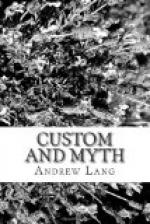to demonstrate that the worshipped ancestor was really
the Red Dawn, is not logical nor convincing.
Even if that middle stage were established, it is
a far cry from the worship of Dawn (supposed by the
Australians to be a woman of bad character in a cloak
of red’ possum-skin) to the adoration of the
Infinite. Our own argument has been successful
if we have shown that there are not only two possible
schools of mythological interpretation—the
Euhemeristic, led by Mr. Spencer, and the Philological,
led by Mr. Max Muller. We have seen that it is
possible to explain the legend of Tsui Goab without
either believing him to have been a real historical
person (as Mr. Spencer may perhaps believe), or his
myth to have been the result of a ‘disease of
language’ as Mr. Muller supposes. We have
explained the legend and worship of a supposed dead
conjurer as natural to a race which believes in conjurers
and worships dead men. Whether he was merely
an ideal ancestor and warrior, or whether an actual
man has been invested with what divine qualities Tsui
Goab enjoys, it is impossible to say; but, if he ever
lived, he has long been adorned with ideal qualities
and virtues which he never possessed. The conception
of the powerful ancestral ghost has been heightened
and adorned with some novel attributes of power:
the conception of the Infinite has not been degraded,
by forgetfulness of language, to the estate of an
ancestral ghost with a game leg.
* * * * *
If this view be correct, myth is the result of thought,
far more than of a disease of language. The
comparative importance of language and thought was
settled long ago, in our sense, by no less a person
than Pragapati, the Sanskrit Master of Life.
’Now a dispute once took place between Mind
and Speech, as to which was the better of the two.
Both Mind and Speech said, “I am excellent!”
Mind said, “Surely I am better than thou, for
thou dost not speak anything that is not understood
by me; and since thou art only an imitator of what
is done by me and a follower in my wake, I am surely
better than thou!” Speech said, “Surely
I am better than thou, for what thou knowest I make
known, I communicate.” They went to appeal
to Pragapati for his decision. He (Pragapati)
decided in favour of Mind, saying (to Speech), “Mind
is indeed better than thou, for thou art an imitator
of its deeds, and a follower in its wake; and inferior,
surely, is he who imitates his better’s deeds,
and follows in his wake."’
So saith the ‘Satapatha Brahmana.’ {211}
FETICHISM AND THE INFINITE.




